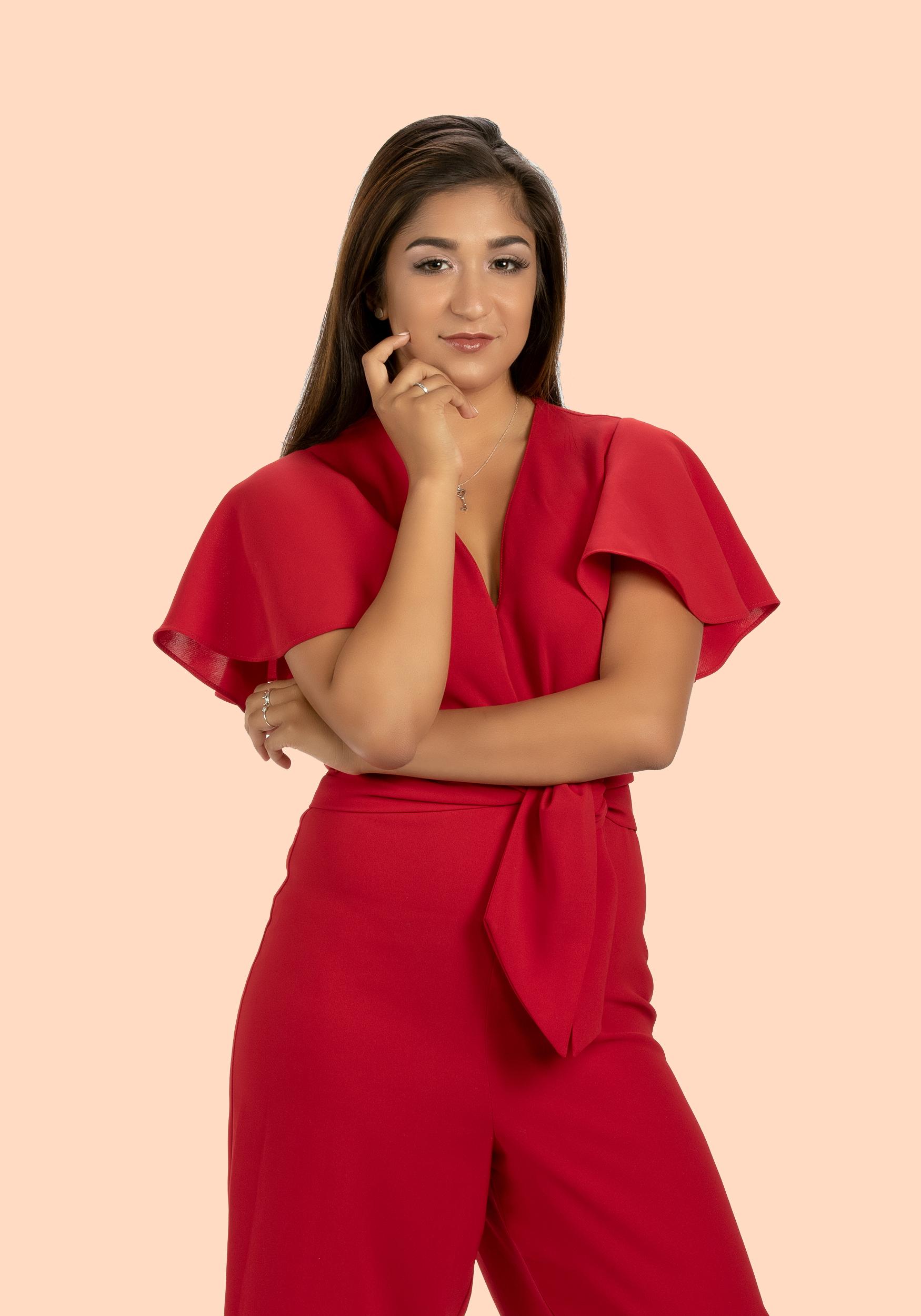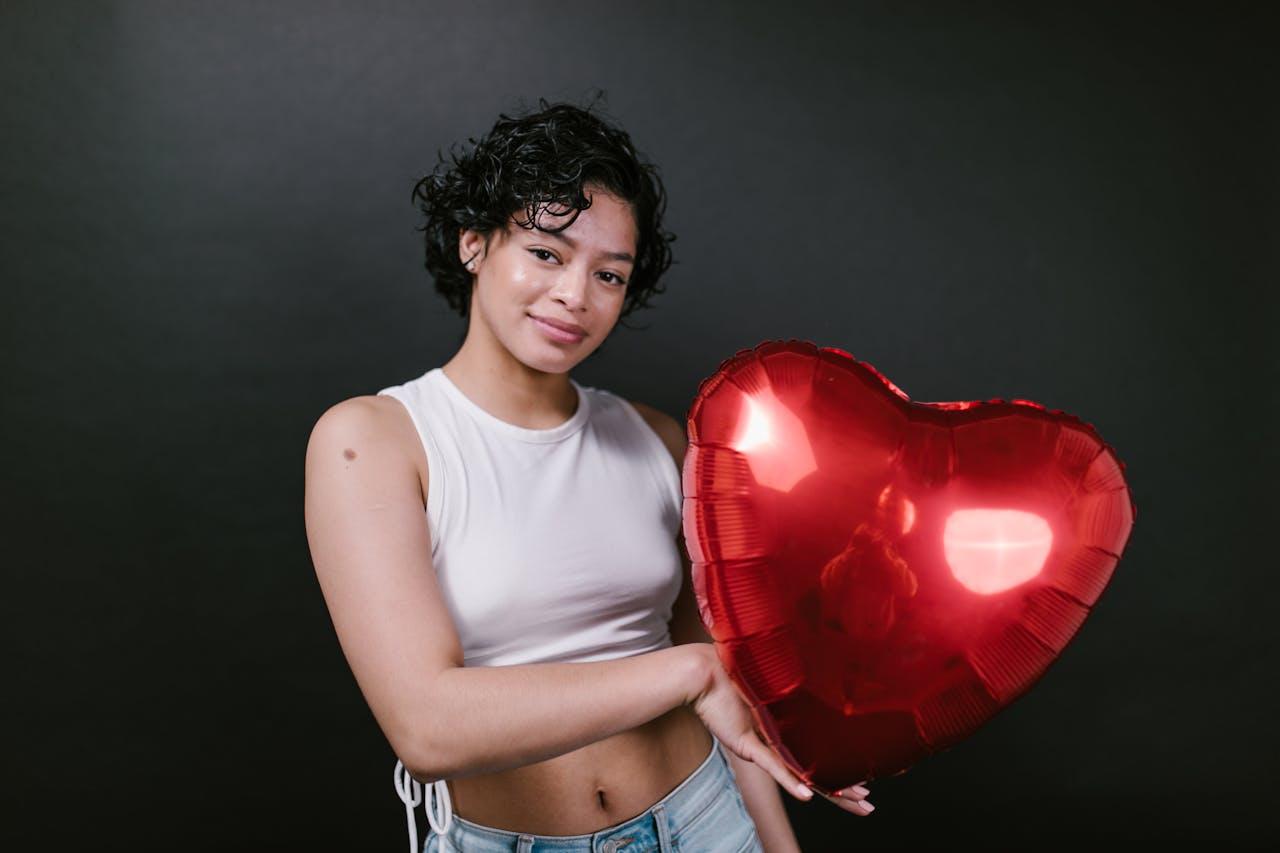Jasmin Allen is redefining the power of branding in her new position as Senior Vice President of Hennessy’s US operations. Beginning at Moët Hennessy in 2016 as Brand Director for Belvedere Vodka, now, Allen is the highest-ranking Black executive at Moët Hennessy USA and one of few female executives to hold this level of position in the spirits industry. Her approach to brand leadership with conversion to social impact is unmatched. Under Allen’s leadership, she prides herself in her commitment to create culturally resonating campaigns followed by community and financial action.
Prior to her time with Moët Hennessy, Allen spent almost eight years with The Coca-Cola Company, moving up to the position of senior manager for entertainment marketing. Jasmin is also heavily involved in mentorship and has been a strong advocate of improving diversity at Moët Hennessy USA. She is a member of the Moët Hennessy Global Diversity, Equity, and Inclusion Council and serves on the Leadership Committee. With Allen’s leadership, Hennessy US has released a limited-edition Hennessy X.O 49 Commemorative Cocktail Set honoring the first Black South Asian American Madam Vice President. The offering serves as a celebration of those who break boundaries, shatter glass ceilings and champion the next generation of women empowerment. The historic appointment marked an important milestone: the first graduate of a Historically Black College and University (HBCU) to ascend to the highest level of government. To honor this legacy, Hennessy has pledged an additional monetary donation to long-term partner, the Hennessey Fellows Program x Thurgood Marshall College Fund (TMCF), in support of the advancement of Black women into the C-Suite.
Furthermore, Allen has led Moët Hennessy USA to be the official spirit of the NBA and WNBA in its campaign,Make Moves That Start Movements. And with the work of Moët Hennessy’s “Never Stop, Never Settle Society” Allen’s work has not only carved pathways for underrepresented individuals — she has also set the standard for all industries to positively promote social change and celebrate cultural diversity.
Her Agenda: How did your passion for brand development and marketing begin?
Jasmin Allen: My parents, my whole life, would drink Coca-Cola Classic. So growing up they would drink other things, but when it came to non-water or non-alcohol they tended to drink Coca-Cola Classic. So, I got my first introduction to brand loyalty when I was younger. Even my mother to this day still stocks red coke cans in her refrigerator, and I loved the commercials I saw on TV. After college, I worked for about four years, and then I decided that I wanted to go back to business school because I did have a genuine interest in marketing. I was working in consulting at the time and knew that business school was a way to change careers. It’s a great way to kind of reset and be able to focus on the area that you want to ultimately spend your career working in. So I went to business school and studied marketing and fell even more in love with it. I had an internship with Coca-Cola between my first and second years – I went to business school at Duke full-time and went to Coke, and spent the summer there and just felt that it was a fantastic place to learn how to be a marketer.
I was one of nine interns that summer. Four of us got full-time offers and I was one of those who was honored with a full-time offer. So I ultimately moved to Atlanta and started my career there after business school, and I’ve never looked back. I think marketing is fantastic because you get so many different components. You get the consumer component, you get the strategy component. You get the opportunity to see people buy your products at the point of purchase. You get to see people celebrating your products. I think there are few things in life that are as rewarding as that. I’m really glad that I made the decision fairly early on to be a marketer and I’ve been very proud of it to this day.
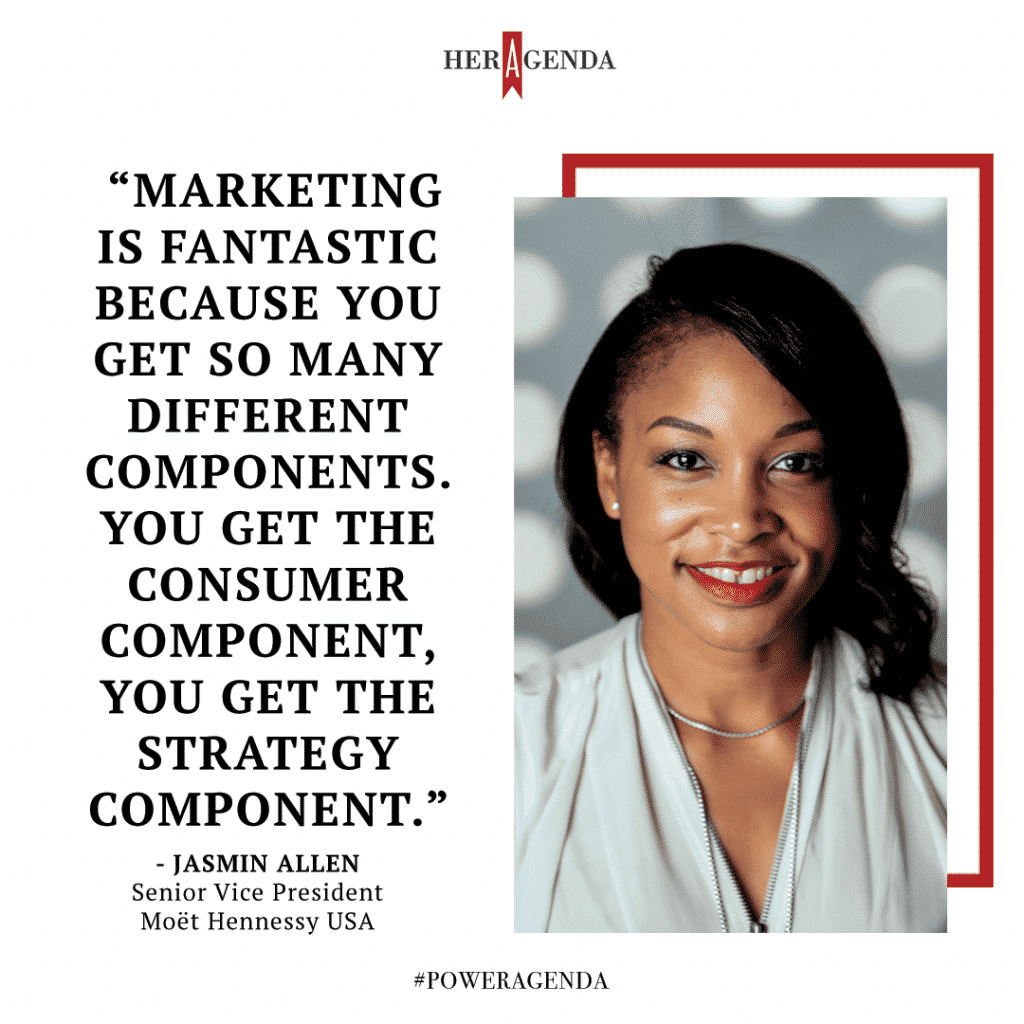
Her Agenda: Did you always know you wanted to be in the Food & Beverage industry? Specifically in the wine & spirits industry?
Jasmin Allen: One of the things that have served me well in my career as I look back is my willingness to be open-minded. So I wasn’t necessarily set on an industry. I knew that when I was coming out of business school, I wanted to start in a company that was known for classically training you in how to be a marketer. So that was one of the reasons why I decided on Coke. I would have maybe chosen either Coca-Cola, or P&G, or Nike, classically known marketing companies that are fantastic for teaching you the skills of marketing. But even after that, I said to myself, “I’m at Coca-Cola now, but that didn’t mean that I could only be at Coca-Cola.” I was always open to different things. Then, I was offered the opportunity, after I was at Coke for seven years, to work in the wireless industry. I worked for T-Mobile. Completely different industry and I learned a ton. And then similarly, I was approached about an opportunity to interview for a job on the Belvedere vodka brand, which is one of our sister brands. It’s Moët Hennesy, and I hadn’t actually considered wines and spirits before then.
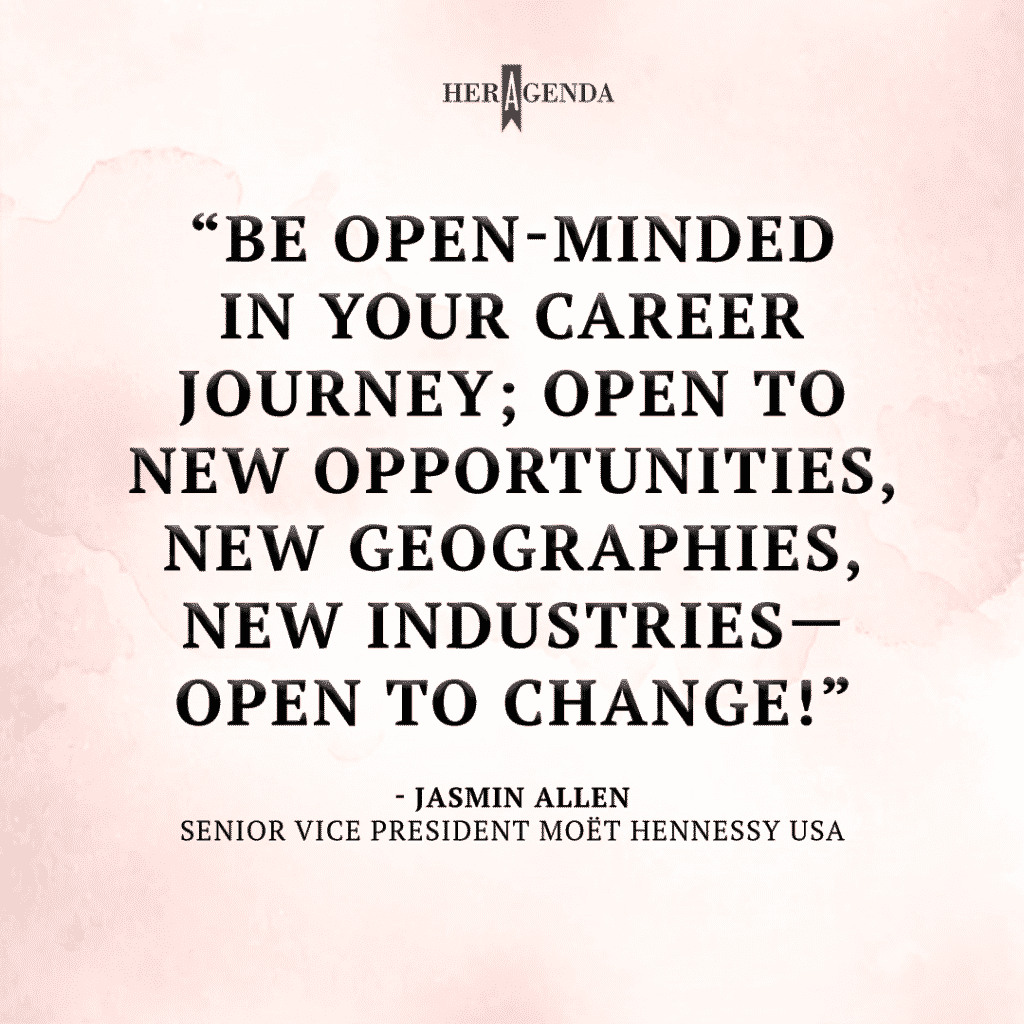
Her Agenda: What lessons did you learn at your time with Coca-Cola & T-Mobile that you still use today as Senior Vice President of Hennessy?
Jasmin Allen: I would say that from Coca-Cola, I learned marketing fundamentals. I learned the importance of understanding strategy. I learned the importance of brand architecture. I learned the importance of understanding the consumer. I learned the importance of understanding the business. When I was an associate brand manager on Dasani [Water], one of my primary jobs was to be the primary analyst which was looking at business performance and having to share with my higher-ups at the time, “what are we doing, how are we trending?” So these are all things that I still use very much in my career now. I would say from T-Mobile, T-Mobile taught me the need to be able to move with precision but to move with haste.
The wireless industry is super fast-paced. It’s very competitive and you can pretty much count on the fact that when you’re watching TV, you’re going to see some sort of wireless commercial from AT&T, Verizon, or T-Mobile. It’s just part of the way those industries work. And because it’s so competitive, that means that when one provider does something, then we feel like we have to respond. So you tend to be moving fast all the time, but you still have to move with accuracy, and with strategy. That helps me now because Hennessy is a very big and important brand, and there are a lot of facets to it.
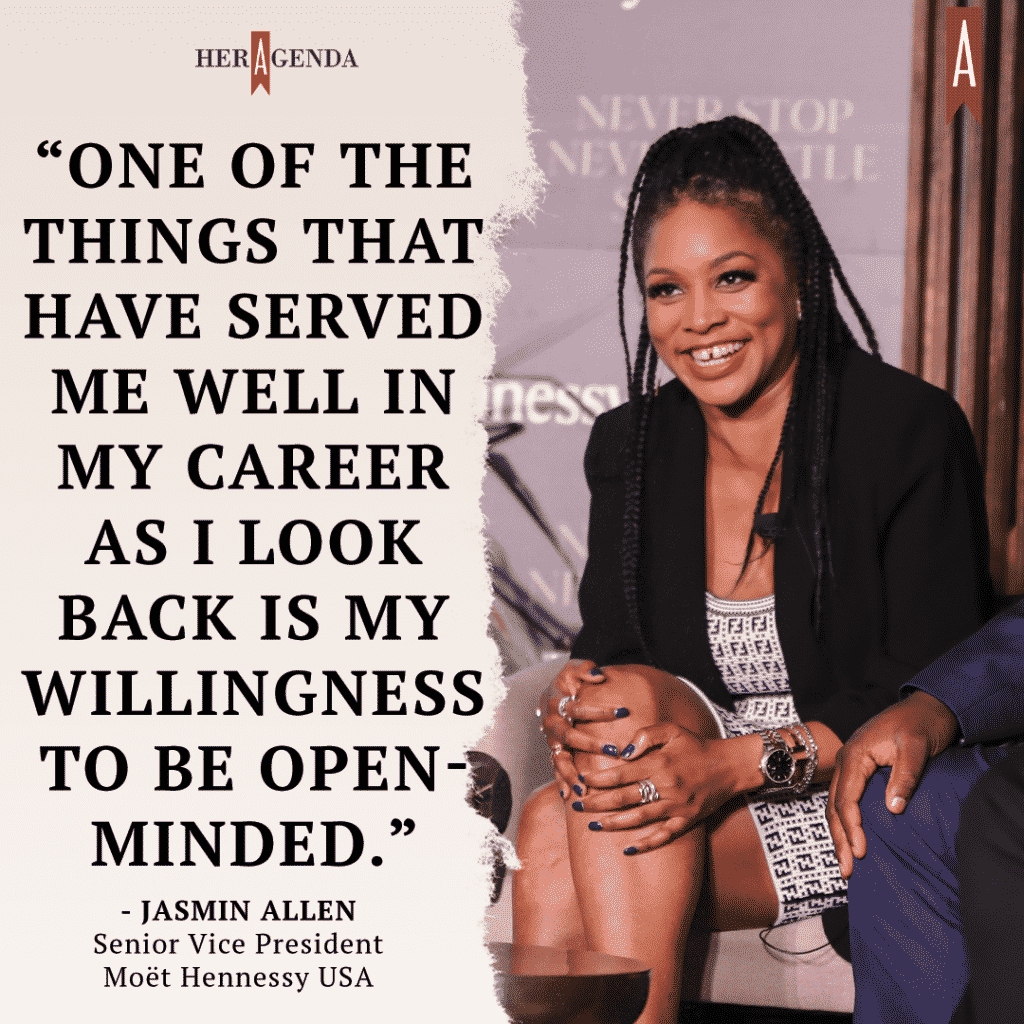
Her Agenda: Do you think Entertainment Marketing is the most effective type of Marketing for the beverage industry? If so, why?
Jasmin Allen: I think that entertainment marketing is an effective way of marketing. I won’t necessarily say is it the most effective. There are a variety of different ways that you can reach the consumer. But I think in particular with entertainment marketing, the beauty of it is that it capitalizes on passion points. When you get a consumer and you engage with them where they’re passionate, that’s where they’re the most receptive. That’s where they’re open.
Leveraging the verticals of entertainment to reach a consumer can be extremely, extremely valuable. Honestly, when a consumer is really into something, they’re giving it their whole heart. So ultimately, you want to be able to make an emotional connection with the consumer. That’s why I think that entertainment marketing is a great way to reach them. I would also say, sports is similar in that regard, that people that are fans of a sport or of its team, they, too, are passionate about that. Sports marketing can be another vehicle, similar to entertainment marketing, to make a compelling connection to the consumer, which can be beneficial to your brand and to your business.
-Trust what feels right for you and believe in the choices you make when it comes to your career, even if those choices are unpopular.
Her Agenda: How do you think the wine & spirits industry can positively promote social change?
Jasmin Allen: All industries should positively promote social change. At Hennessy, we have a rich legacy of promoting positive social change, and we’re committed to celebrating and championing cultural diversity, a key part of our brand. For us, it’s important to serve as an active participant in the Black community through the ongoing support that we have of civic organizations and the introduction of initiatives that are near and dear to us that we think can help move the needle. We are going to continue our Hennessy Fellows Program which was introduced back in 2019. It is the first-ever corporate, historically Black college and university graduate program that we developed in partnership with the Thurgood Marshall College Fund (TMCF). TMCF is a renowned national organization that’s dedicated to promoting educational excellence amongst students who are attending HBCUs. We’re super proud that we have the opportunity to partner with them. We created the Hennessy Fellows Program with them that will help to prepare the next generation of workforce talent.
Also, in 2020, yes, bred out of the COVID crisis, but something that we are going to stay very committed to into the future is our Unfinished Business initiative that we launched in order to help the Black, Asian, and Latinx small businesses that have been impacted by COVID-19 with financial assistance and also mentorship to help them get back on their feet. So I think it’s important for brands to show commitment, to not just speak about commitment, but show it through their actions. At Hennessy, we’re proud to continue to show our commitment. We’re also going to continue the programming that we’re known for and that is the latest iteration of our Hennessy V.S. Wild Rabbit narrative. “What’s Your Wild Rabbit” has been our consumer-facing call to action for multiple years, and we released our latest campaign in support of that back in the fall. It spotlights the world’s first Black chess grandmaster, Maurice Ashley.
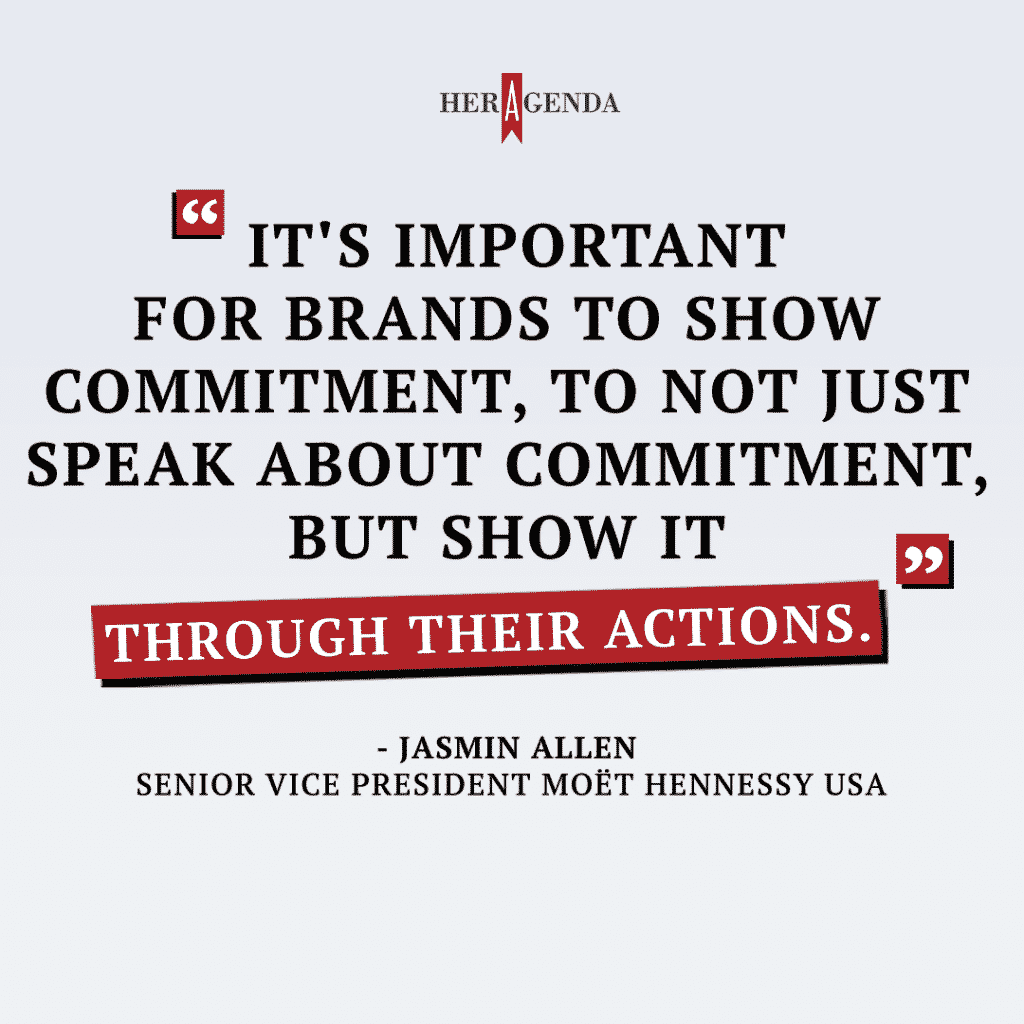
Her Agenda: How do you think the wine & spirits industry can be more accessible for women of color?
Jasmin Allen: I think that what could be helpful is creating women’s focused initiatives that have diverse representation. Supporting the creation of mentorship and coaching programs for women of color that give them visibility within the organization and in the industry [is important]. And also, it’s critical to focus on the retention and promotion of women of color, to ensure that they feel supported, that they feel that they can grow their careers within your organization, and then that they can ascend. This idea of ascending is very important. If you do these things: put programs in place, but also make it clear to Black women that their retention and their promotion is a priority for your company. I think that will go a long way toward ensuring that they feel they have the support that they need and the pathway that they need to make it and rise through the ranks.
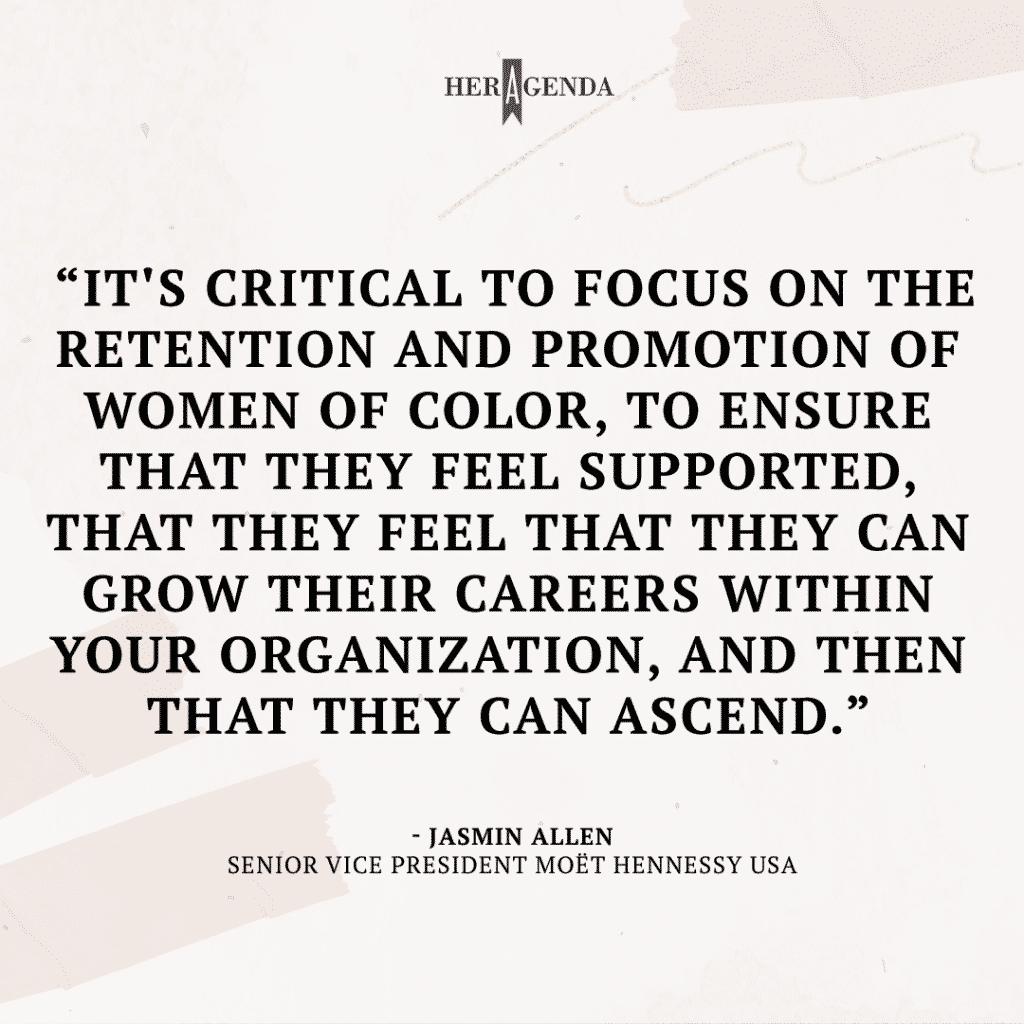
Her Agenda: Do you think brand strength and strategic marketing have the power to influence laws and policy? How does your work at Hennessy aim to make changes in social justice?
Jasmin Allen: Last year, the convergence of Black Lives Matter and the pandemic exacerbated and intensified public attention to the unequal vulnerability and racialized inequalities that exist for Black communities. Brands have a role to play in impacting social progress and the ability to spur change. To do so, they need to act.
-Brands have a role to play in impacting social progress and the ability to spur change. To do so, they need to act.
Hennessy’s spirit of inclusion and progressive equality is long-standing and guides our actions. We will continue to evolve and expand our efforts to support community development, such as our Unfinished Business Program and the Hennessy Fellows program with our partner The Thurgood Marshall College Fund. Additionally, we look forward to [the growth of the Never Stop, Never Settle Society] that champions Black entrepreneurship in a way that is uplifting and culturally relevant to the social equality movement in the U.S.
Her Agenda: What is your career advice to young women striving to be in an executive role like yourself?
Jasmin Allen: Trust what feels right for you and believe in the choices you make when it comes to your career, even if those choices are unpopular. I would also say to be open-minded in your career journey; open to new opportunities, new geographies, new industries—open to change!
[Editor’s note: This interview has been edited for length and clarity.]



